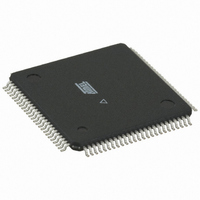ATMEGA2560-16AI Atmel, ATMEGA2560-16AI Datasheet - Page 440

ATMEGA2560-16AI
Manufacturer Part Number
ATMEGA2560-16AI
Description
IC AVR MCU 256K 16MHZ 100TQFP
Manufacturer
Atmel
Series
AVR® ATmegar
Specifications of ATMEGA2560-16AI
Core Processor
AVR
Core Size
8-Bit
Speed
16MHz
Connectivity
EBI/EMI, I²C, SPI, UART/USART
Peripherals
Brown-out Detect/Reset, POR, PWM, WDT
Number Of I /o
86
Program Memory Size
256KB (128K x 16)
Program Memory Type
FLASH
Eeprom Size
4K x 8
Ram Size
8K x 8
Voltage - Supply (vcc/vdd)
4.5 V ~ 5.5 V
Data Converters
A/D 16x10b
Oscillator Type
Internal
Operating Temperature
-40°C ~ 85°C
Package / Case
100-TQFP, 100-VQFP
For Use With
ATSTK600-TQFP100 - STK600 SOCKET/ADAPTER 100-TQFPATSTK503 - STARTER KIT AVR EXP MODULE 100P
Lead Free Status / RoHS Status
Contains lead / RoHS non-compliant
Available stocks
Company
Part Number
Manufacturer
Quantity
Price
Company:
Part Number:
ATMEGA2560-16AI
Manufacturer:
ATMEL
Quantity:
1 000
- Current page: 440 of 444
- Download datasheet (10Mb)
2549M–AVR–09/10
23 2-wire Serial Interface .......................................................................... 241
24 AC – Analog Comparator .................................................................... 271
25 ADC – Analog to Digital Converter ..................................................... 275
26 JTAG Interface and On-chip Debug System ..................................... 296
27 IEEE 1149.1 (JTAG) Boundary-scan ................................................... 302
23.1
23.2
23.3
23.4
23.5
23.6
23.7
23.8
23.9
24.1
24.2
25.1
25.2
25.3
25.4
25.5
25.6
25.7
25.8
26.1
26.2
26.3
26.4
26.5
26.6
26.7
26.8
26.9
27.1
27.2
Features ........................................................................................................241
2-wire Serial Interface Bus Definition ............................................................241
Data Transfer and Frame Format ..................................................................242
Multi-master Bus Systems, Arbitration and Synchronization .........................245
Overview of the TWI Module .........................................................................246
Using the TWI ................................................................................................249
Transmission Modes .....................................................................................252
Multi-master Systems and Arbitration ............................................................265
Register Description ......................................................................................266
Analog Comparator Multiplexed Input ...........................................................271
Register Description ......................................................................................272
Features ........................................................................................................275
Operation .......................................................................................................276
Starting a Conversion ....................................................................................277
Prescaling and Conversion Timing ................................................................278
Changing Channel or Reference Selection ...................................................282
ADC Noise Canceler .....................................................................................283
ADC Conversion Result .................................................................................288
Register Description ......................................................................................289
Features ........................................................................................................296
Overview ........................................................................................................296
TAP - Test Access Port .................................................................................297
Using the Boundary-scan Chain ....................................................................299
Using the On-chip Debug System .................................................................299
On-chip Debug Specific JTAG Instructions ...................................................300
Using the JTAG Programming Capabilities ...................................................301
Bibliography ...................................................................................................301
On-chip Debug Related Register in I/O Memory ...........................................301
Features ........................................................................................................302
System Overview ...........................................................................................302
ATmega640/1280/1281/2560/2561
v
Related parts for ATMEGA2560-16AI
Image
Part Number
Description
Manufacturer
Datasheet
Request
R

Part Number:
Description:
IC AVR MCU 2.4GHZ XCEIVER 64QFN
Manufacturer:
Atmel
Datasheet:

Part Number:
Description:
Manufacturer:
Atmel
Datasheet:

Part Number:
Description:
MCU ATMEGA644/AT86RF230 40-DIP
Manufacturer:
Atmel
Datasheet:

Part Number:
Description:
BUNDLE ATMEGA644P/AT86RF230 QFN
Manufacturer:
Atmel
Datasheet:

Part Number:
Description:
BUNDLE ATMEGA644P/AT86RF230 TQFP
Manufacturer:
Atmel
Datasheet:

Part Number:
Description:
MCU ATMEGA1281/AT86RF230 64-TQFP
Manufacturer:
Atmel
Datasheet:

Part Number:
Description:
MCU ATMEGA1280/AT86RF230 100TQFP
Manufacturer:
Atmel
Datasheet:

Part Number:
Description:
BUNDLE ATMEGA1280/AT86RF100-TQFP
Manufacturer:
Atmel
Datasheet:

Part Number:
Description:
BUNDLE ATMEGA2560V/AT86RF230-ZU
Manufacturer:
Atmel
Datasheet:

Part Number:
Description:
MCU ATMEGA2561/AT86RF230 64-TQFP
Manufacturer:
Atmel
Datasheet:

Part Number:
Description:
INTERVAL AND WIPE/WASH WIPER CONTROL IC WITH DELAY
Manufacturer:
ATMEL Corporation
Datasheet:

Part Number:
Description:
Low-Voltage Voice-Switched IC for Hands-Free Operation
Manufacturer:
ATMEL Corporation
Datasheet:

Part Number:
Description:
MONOLITHIC INTEGRATED FEATUREPHONE CIRCUIT
Manufacturer:
ATMEL Corporation
Datasheet:

Part Number:
Description:
AM-FM Receiver IC U4255BM-M
Manufacturer:
ATMEL Corporation
Datasheet:











